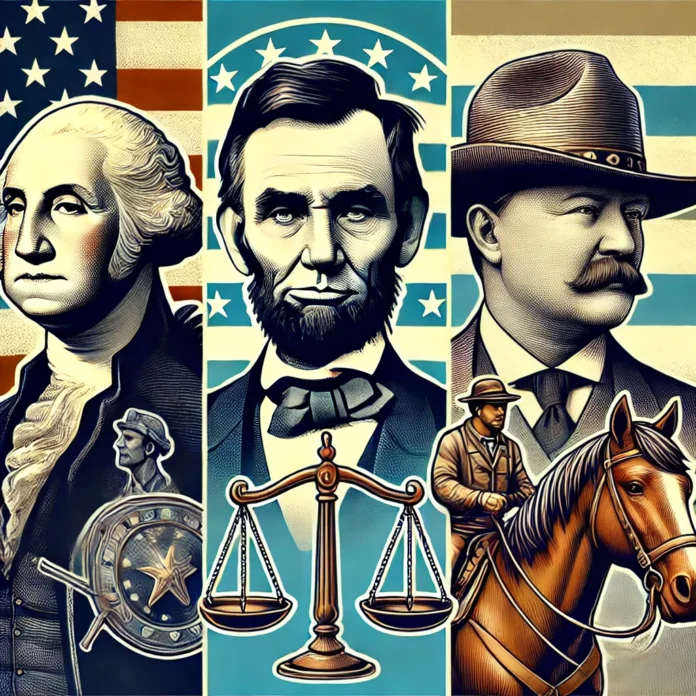Throughout American history, Presidents of the United States have been given nicknames that reflect their personalities, accomplishments, or even their scandals. These monikers often come from political rivals, the press, or the public, and they reveal how presidents were perceived during their time. Here are some of the most notable presidential nicknames and the stories behind them, listed in chronological order:
“The Father of His Country” – George Washington (1789–1797)
This title, bestowed upon Washington during his lifetime, reflects his critical role in the founding of the United States. As the leader of the Continental Army during the Revolutionary War and the first President, Washington set a precedent for future leaders. Historians and contemporaries alike used this nickname to emphasize his importance as a unifying figure in the early republic.
“Old Man Eloquent” – John Quincy Adams (1825–1829)
After serving as president, John Quincy Adams became a congressman, where he was known for his passionate speeches against slavery and his dedication to public service. His eloquence and moral conviction in this later stage of his career earned him this nickname.
“Old Hickory” – Andrew Jackson (1829–1837)
Andrew Jackson earned the nickname “Old Hickory” from his soldiers during the War of 1812, particularly for his toughness and resilience. Hickory wood, known for its strength, was a fitting metaphor for Jackson’s leadership style. This nickname became central to his populist image, reflecting his persona as a man of the people and a strong-willed leader.
“Honest Abe” – Abraham Lincoln (1861–1865)
Arguably the most famous presidential nickname, “Honest Abe” originated from Lincoln’s reputation for integrity during his early days as a lawyer and politician in Illinois. He was known for settling disputes fairly and for his unwavering commitment to principles of justice. The nickname became a hallmark of his presidency during the Civil War, symbolizing his dedication to preserving the Union and abolishing slavery.
“Silent Cal” – Calvin Coolidge (1923–1929)
Known for his brevity in conversation and speeches, Calvin Coolidge was affectionately dubbed “Silent Cal.” The nickname reflected his reserved personality and a governing style that emphasized minimal government intervention.
“The Rough Rider” – Theodore Roosevelt (1901–1909)
This nickname stems from Roosevelt’s leadership of the Rough Riders, a volunteer cavalry regiment during the Spanish-American War. His adventurous and rugged persona, combined with his love for the outdoors, solidified his image as a dynamic and energetic leader.
“Tricky Dick” – Richard Nixon (1969–1974)
This less flattering nickname originated during Nixon’s 1950 campaign for the U.S. Senate against Helen Gahagan Douglas, where critics accused him of employing underhanded political tactics. The press and his political opponents used “Tricky Dick” to highlight perceptions of Nixon as secretive and untrustworthy—a reputation that ultimately overshadowed his presidency during the Watergate scandal.
“The Great Communicator” – Ronald Reagan (1981–1989)
Ronald Reagan’s ability to connect with the American public earned him this nickname. Whether through his speeches or his use of television, Reagan had an unparalleled ability to articulate his vision and rally support. The term was coined by both admirers and the media, who recognized his skill in effectively conveying his message.
“The Peanut Farmer” – Jimmy Carter (1977–1981)
Before entering politics, Jimmy Carter managed his family’s peanut farm in Georgia. While the nickname “The Peanut Farmer” was initially used derisively by critics to emphasize his outsider status, Carter embraced it, using his humble background to connect with voters who appreciated his straightforward and unpretentious approach.
“No Drama Obama” – Barack Obama (2009–2017)
President Obama earned this nickname from his staff and the media for his calm and composed demeanor, even in the face of significant challenges. It became emblematic of his leadership style, contrasting with the often chaotic nature of politics.
“The Donald” – Donald Trump (2017–2021)
Long before his presidency, Trump earned the nickname “The Donald,” popularized by a 1989 interview with his then-wife Ivana Trump. The nickname became a cultural shorthand for Trump’s larger-than-life persona in the business world and his later career in television and politics. During his presidency, additional monikers, both critical and admiring, emerged, reflecting his polarizing impact on American politics.
Conclusion
Presidential nicknames serve as snapshots of how these leaders were perceived in their time. Whether admiring or critical, they provide a lens into the personalities and legacies of the individuals who have shaped American history. These names endure, offering a fascinating way to connect with the stories behind the presidency.




